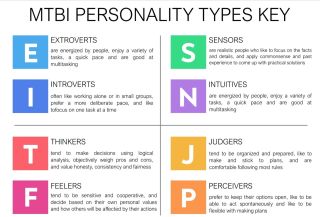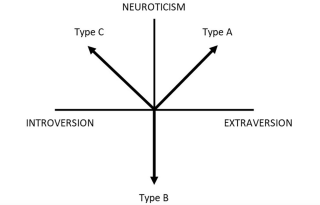Type A and Type B Personality Theory
Are You a Type C Personality? Pay Attention to Your Marriage
To stay married, type Cs need to do the opposite of their natural tendencies.
Posted September 18, 2023 Reviewed by Hara Estroff Marano
Key points
- People who are conflict-avoidant divorce at higher rates than those who are not.
- Type C's have a hard time speaking up about what's bothering them.
- Type Cs don't really "let relationship issues go."
- Bad habits Type Cs demonstrate can be changed, but doing so may require outside intervention.
Personality typing may be as old as the human race itself.
Okay, earliest humans may not have examined their peers this way since they were likely too worried about getting eaten by lions and tigers to think of such things.

But, we do know that around 371 to 287 BC, the Greeks and Romans recognized four personality types: melancholic, choleric, sanguine, and phlegmatic. Melancholics tended toward black moods and deep reflection; cholerics were goal-orientated and analytic; sanguine people were sociable and impulsive; and phlegmatics were unassuming and intuitive.
Today, social scientists have developed more elaborate tools to assess people. Their instruments include—but aren't limited to—the Myers-Briggs Personality Test (perhaps the most complex typing system, with 16 types), and the Temperament and Character Inventory (which has four temperaments and three characteristics).
These models are interesting and can provide a framework for understanding human behavior. They can also be used to help predict behavior and even correct behavior.

What’s Your Personality Type?
Most of us have heard of Type A and Type B personalities, and I’m guessing we all know lots of people who fit the stereotypes. At their best, Type A folks are successful in their careers, they are great planners, and they get things done. At their worst, they can be driven, uptight, competitive, and even cut-throat. A's like to be the star and to rise above others (in reality or just in their own mind).
Their counterpart, the Type B personality, tends to be more laid back, easy-going, and yielding. They let things roll off their back and they go with the flow fairly easily. They are not driven by a need to be successful and not motivated to get things accomplished. Instead, B's make good teammates because they care very much about other people's feelings and needs.
A pair of cardiologists, [Meyer] Friedman and [Ray] Rosenman, first identified the A and B types in the 1950s, after noticing a connection between heart disease and those with certain lifestyle choices and behaviors (Type A).
What you may not know is that a third and fourth classification of personality have been identified in more recent years—the Type C and Type D personalities Positive aspects of those who are Type D are that they can be methodical and they tend to think things through. Negative D traits include being big worriers, pessimistic, and insecure.
Since this article focuses on the Type C personality, I’ve saved this one for last. Just as with the connection of Type A's and heart issues, doctors saw a pattern with Type C and cancer, due to the stuffing (or internalization) of negative emotions.
Type C personalities "often seem quiet, focused, introverted and thoughtful." They also often have trouble opening up emotionally and expressing their needs. They would rather let others have their way in order to maintain group harmony.

The problem isn’t so much that C’s yield to the needs of others; the problem is that they don’t express what they need because they would rather not have an argument. As a result, over time, they can begin to resent their mate in a big way. They may tell themselves that they have “let their anger go,” as my client Ron told me recently, but more times than not, resentments will build until Type C can’t take it anymore. In fact, that’s how you know the bad feelings weren't "let go of." If they truly had been, there would be no blowups.
Here's the thing: If you can’t express yourself in a relationship, you are headed for high drama. The drama will likely come in the form of an affair, an abrupt exit (“I’m outta here!”), or an illness of some kind. Unacknowledged emotions don’t go away; they go inward or outward.
Have You Been Left by a “C”? What the Heck Happened?
In cases where one spouse leaves with no explanation or warning, it's a pretty safe bet that this person is a Type C. These folks often had one or both parents who got mad easily (so anger scares them) or had parents who modeled a non-confrontational style of relating.

C’s can fume for years while their partners have no idea that anything is wrong (C’s are good at putting on a smile while simultaneously harboring grudges).
If you have been left by a Type C personality, the first thing for you to remember is that it’s ultimately the C’s shortcoming that caused them to leave*. If they failed to tell you their thoughts, they never gave you a chance to make things better.
This doesn't mean you are without blame. Ask yourself whether you were a welcoming presence if or when your mate let you know something was bothering them, or if were you quick to anger or defensiveness in your reply. Were you too dismissive, therefore not allowing them to express themselves? Or did you display another behavior that made it challenging for them to speak up?
(*in cases where there is domestic violence, it truly isn’t safe to speak, and this article isn’t intended to address this more extreme circumstance).
Are You a “C” Who Is Thinking of Leaving?
If you are a Type C and you have a chronic low boil of negative feelings from built-up grievances that are causing you to want out in a big (dramatic) way, it’s in your best interest to change your behavior now. Being easy-going and non-confrontational are virtues only if you are truly not bothered by your mate’s behavior. When you’re upset by your loved one’s actions and you don’t tell them, not only do you give your power away but you are not showing up authentically as the adult that you are.
You can choose to end the relationship but, if you don’t change how you’re showing up currently, you’ll continue to have superficial and problematic relationships (not just intimate relationships, either).
How to Stop Your Type C Avoidance
The first step in most change is to be honest with yourself. Admit that you have some hard feelings and that your inability to confront the source of the hard feelings is not working. Sometimes, just seeing yourself act in an unproductive way is enough to make you stop the dysfunction.
The solution doesn't come just from seeing yourself do the same familiar behavior. You have to know to put new skills into place.
Most of us need some outside help in order to change.
- Get individual therapy or coaching to learn new ways of being in relationships.
- Seek couples therapy to get help understanding the dynamic between you and your partner.
- Read books like Attached: The New Science of Adult Attachment and How It Can Help You Find and Keep, or Get Out of Your Own Way: Overcoming Self-Defeating Behavior, Overcoming Avoidance Workbook: Break the Cycle of Isolation and Avoidant Behaviors to Reclaim Your Life from Anxiety, Depression, or PTSD or, books on ending relationships such as Should I Stay or Go? or Contemplating Divorce
Conclusion
Relationship dynamics are complex and depend on various factors such as communication skills, emotional intelligence, compatibility, and personal values. While certain personality traits may present challenges in relationships, you hold the key to change. Speaking up when you've been conflict-avoidant your whole life might feel extremely dangerous. Get help and guidance from professionals near you to make different decisions.
It's worth noting that successful relationships require effort and a willingness to work on oneself and the partnership. Some challenges that individuals with avoidant tendencies might face in relationships include difficulty expressing emotions or needs, feeling overwhelmed by social interactions, and needing an atmosphere of emotional safety, to be honest. Such challenges can all be addressed through effective communication, understanding, and compromise between partners.
It is essential to remember that personality is multifaceted and influenced by various factors. People of all personality types can thrive in relationships when they are committed to personal growth, emotional well-being, and building healthy connections with their partners.
If you are a C, remember that what you don’t work through now, you won’t be able to avoid forever. Your troubled ways of coping will continue to show up. You will hurt others and you will be hurt. Getting on the other side of this habit could save your marriage...and your life.



